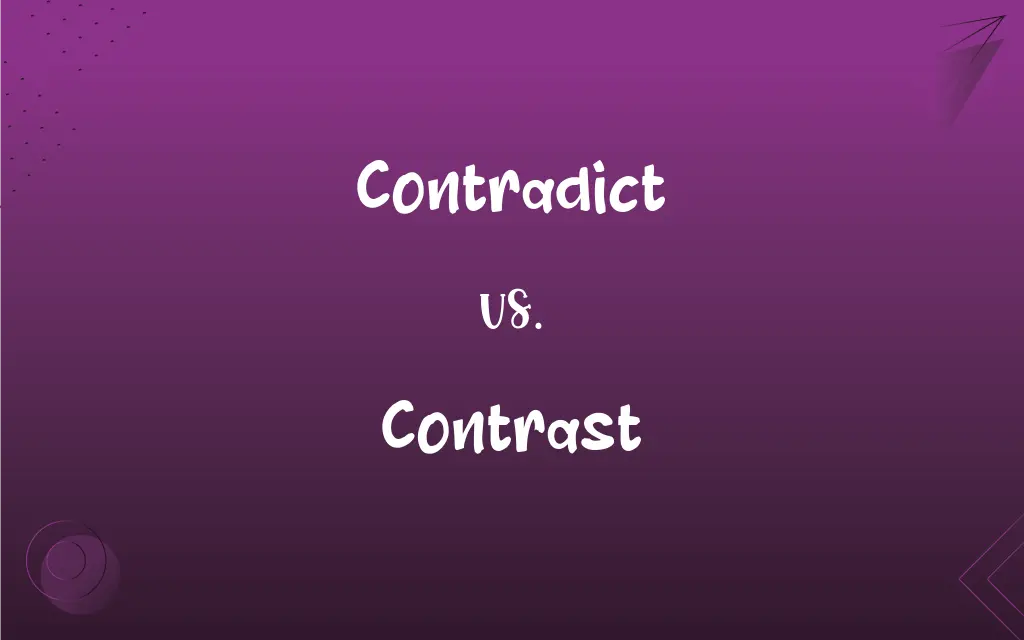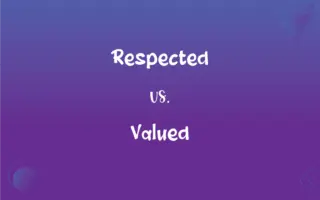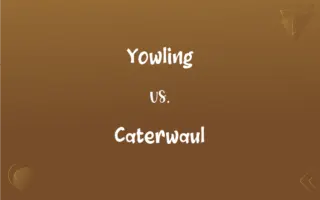Contradict vs. Contrast: What's the Difference?
Edited by Aimie Carlson || By Janet White || Updated on October 7, 2023
Contradict means to assert the opposite of a statement, while contrast means to show differences when compared.

Key Differences
Contradict and Contrast are two terms that, while related to differences, vary in their applications and meanings. To contradict is to challenge, oppose, or deny the truth or accuracy of something. It's an active refusal or rebuttal. For instance, if one person says it's raining and another says it's not, the latter is contradicting the former. In essence, to contradict is to present an antithesis or negation of a given statement or idea.
In comparison, to contrast means to set things side by side in such a way that their differences are highlighted. While contradicting often deals with opposing viewpoints or statements, contrasting deals with the evaluation or juxtaposition of two or more objects, ideas, or situations. When you contrast summer and winter, you aren't negating one with the presence of the other; you're emphasizing how they differ.
Contradict has a confrontational undertone. It implies a clash or a disagreement. Contrast, on the other hand, does not inherently imply conflict. It's a method often employed in arts, literature, or any field where comparative analysis aids understanding. In art, contrasting colors can make each pop; in literature, contrasting characters can elucidate individual traits.
Further, while the act of contradicting is more verbal and is tied to assertions, contrasting can be both implicit and explicit. A silent comparison between an old and a new building by just looking can be a contrast, while saying "This is old, that is new" is verbalizing that contrast.
In sum, while both terms deal with oppositions, contradict is about direct denial or refutation, and contrast is about highlighting differences through comparison.
ADVERTISEMENT
Comparison Chart
Definition
To deny or challenge the truth of something.
To show differences when placed side by side.
Implication
Confrontational or opposing.
Comparative without conflict.
Usage
Mostly verbal.
Both implicit and explicit.
Inherent Conflict
Yes, often implies disagreement.
No, just highlights differences.
Field of Common Use
Debates, arguments.
Arts, literature, comparative studies.
ADVERTISEMENT
Contradict and Contrast Definitions
Contradict
To assert the opposite of a statement.
She did not hesitate to contradict his claims.
Contrast
To set side by side to show differences.
They contrasted the two paintings to highlight unique styles.
Contradict
To be inconsistent or in conflict with.
His actions contradict his words.
Contrast
To compare to emphasize distinctions.
The author contrasted youth and old age in his novel.
Contradict
To speak against or challenge.
He contradicted the popular opinion at the meeting.
Contrast
The act of distinguishing by comparing differences.
The contrast between the two reports was stark.
Contradict
To assert to be untrue, often by saying the opposite
"The study contradicts the notion that merely keeping busy keeps people healthy" (Richard A. Knox).
Contrast
To exhibit noticeable differences when compared.
His calm demeanor contrasts with his fiery speeches.
Contradict
To assert the opposite of a statement or idea put forward by (someone).
Contrast
To differ strikingly.
The colors contrast beautifully in her artwork.
Contradict
To be contrary to; be inconsistent with
"[Her] almost giddy warmth in conversation appears to contradict her image as a confrontational, politically outspoken performer" (Elysa Gardner).
Contrast
To set in opposition in order to show or emphasize differences
An essay that contrasts city and country life.
Contrasted this computer with inferior models.
Contradict
To make a contradictory statement.
Contrast
To show differences when compared
Siblings who contrast sharply in interests and abilities.
A color that contrasted clearly with the dark background.
Contradict
To deny the truth or validity of (a statement or statements).
His testimony contradicts hers.
Contrast
(Linguistics) To evince a difference that can distinguish meaning
Voiced and voiceless stops contrast in English but not in Cree.
Contradict
To oppose (a person) by denying the truth or pertinence of a given statement.
Everything he says contradicts me.
Contrast
The act of contrasting; a setting off of dissimilar entities or objects.
Contradict
To be contrary to (something).
Contrast
The state of being contrasted
Red berries standing in vivid contrast against the snow.
Contradict
(obsolete) To give an order contrary to (another order or wish), oppose (something).
Contrast
A difference, especially a strong dissimilarity, between entities or objects compared
The contrast between Northern and Southern speech patterns.
Contradict
(obsolete) To give an order contrary to one given by (another person), oppose or resist (someone).
Contrast
One thing that is strikingly dissimilar to another
My new school was a welcome contrast to the one before.
Contradict
(obsolete) To speak against; to forbid.
Contrast
The use of opposing elements, such as colors, forms, or lines, in proximity to produce an intensified effect in a work of art.
Contradict
To assert the contrary of; to oppose in words; to take issue with; to gainsay; to deny the truth of, as of a statement or a speaker; to impugn.
Dear Duff, I prithee, contradict thyself,And say it is not so.
The future can not contradict the past.
Contrast
The difference in brightness between the light and dark areas of a picture, such as a photograph or video image.
Contradict
To be contrary to; to oppose; to resist.
No truth can contradict another truth.
A greater power than we can contradictHath thwarted our intents.
Contrast
(Linguistics) A difference between units, especially one that distinguishes meaning.
Contradict
To oppose in words; to gainsay; to deny, or assert the contrary of, something.
They . . . spake against those things which were spoken by Paul, contradicting and blaspheming.
Contrast
(countable) A difference in lightness, brightness and/or hue between two colours that makes them more or less distinguishable.
Contradict
Be in contradiction with
Contrast
(uncountable) The degree of this difference.
The red and the orange don't have much contrast between them — I can hardly tell them apart.
Contradict
Deny the truth of
Contrast
(countable) A control on a television, etc, that adjusts the amount of contrast in the images being displayed.
Contradict
Be resistant to;
The board opposed his motion
Contrast
(countable) A difference between two objects, people or concepts.
Israel is a country of many contrasts.
Contradict
Prove negative; show to be false
Contrast
(countable) Something that is opposite of or strikingly different from something else.
Contradict
To deny the truth or accuracy of something.
The evidence seems to contradict his alibi.
Contrast
Antithesis.
Contradict
To provide a counter to a point.
The witness's testimony contradicted the defendant's story.
Contrast
(transitive) To set in opposition in order to show the difference or differences between.
Contrast
(intransitive) To form a contrast.
Foreground and background strongly contrast.
Contrast
To stand in opposition; to exhibit difference, unlikeness, or opposition of qualities.
The joints which divide the sandstone contrast finely with the divisional planes which separate the basalt into pillars.
Contrast
To set in opposition, or over against, in order to show the differences between, or the comparative excellences and defects of; to compare by difference or contrariety of qualities; as, to contrast the present with the past.
Contrast
To give greater effect to, as to a figure or other object, by putting it in some relation of opposition to another figure or object.
The figures of the groups must not be all on side . . . but must contrast each other by their several position.
Contrast
The act of contrasting, or the state of being contrasted; comparison by contrariety of qualities.
Place the prospect of the soulIn sober contrast with reality.
Contrast
Opposition or dissimilitude of things or qualities; unlikeness, esp. as shown by juxtaposition or comparison.
The contrasts and resemblances of the seasons.
Contrast
The opposition of varied forms, colors, etc., which by such juxtaposition more vividly express each other's peculiarities.
Contrast
The opposition or dissimilarity of things that are compared;
In contrast to
By contrast
Contrast
The act of distinguishing by comparing differences
Contrast
A conceptual separation or demarcation;
There is a narrow line between sanity and insanity
Contrast
The perceptual effect of the juxtaposition of very different colors
Contrast
The range of optical density and tone on a photographic negative or print (or the extent to which adjacent areas on a television screen differ in brightness)
Contrast
Put in opposition to show or emphasize differences;
The middle school teacher contrasted her best student's work with that of her weakest student
Contrast
To show differences when compared; be different;
The students contrast considerably in their artistic abilities
FAQs
Is "contrast" solely a visual term?
No, "contrast" can be used for ideas, feelings, sounds, etc., not just visual differences.
Can a single item "contrast" on its own?
No, "contrast" involves comparing two or more things to highlight their differences.
Does "contradict" always suggest disagreement?
Often, yes. "Contradict" usually implies opposing or challenging a viewpoint or statement.
What does "contradict" mean?
"Contradict" means to assert the opposite of a statement or deny its truth.
What is the primary meaning of "contrast"?
"Contrast" primarily means to compare in order to highlight differences.
In literature, how is "contrast" often used?
"Contrast" in literature is used to highlight differences between characters, settings, or situations to create depth or tension.
Can a single statement be contradictory?
Yes, if it contains conflicting ideas or elements, it can be considered contradictory.
If someone says the opposite of what I said, did they "contrast" or "contradict" me?
They contradicted you.
Can "contradict" and "contrast" be used interchangeably?
No, they have different meanings; "contradict" implies opposition, while "contrast" emphasizes differences.
What's the noun form of "contradict"?
The noun form is "contradiction."
Is a contradiction always negative?
No, contradictions can be neutral or even constructive, depending on the context.
In art, how is "contrast" used?
"Contrast" in art refers to the arrangement of opposite elements (e.g., dark vs. light colors) to create visual interest.
Can "contrast" be used in debates or arguments?
Yes, to highlight different viewpoints or perspectives.
If two things are very different but not opposed, do they "contradict"?
No, they contrast. "Contradict" implies opposition, not just difference.
Does a contradiction mean someone is lying?
Not necessarily. Contradictions can arise from misunderstandings, different viewpoints, or changes in belief.
Is "contrast" always about stark differences?
No, "contrast" can highlight subtle differences as well.
What's an antonym for "contrast"?
An antonym for "contrast" could be "compare," focusing on similarities rather than differences.
Can "contrast" also be a noun?
Yes, as in "The contrast between night and day is evident."
Is "contrastive" a valid word derived from "contrast"?
Yes, "contrastive" means relating to or exhibiting contrast.
When would one use "contradict" in scientific discussions?
When one piece of data or conclusion opposes or challenges another, it can be said to "contradict."
About Author
Written by
Janet WhiteJanet White has been an esteemed writer and blogger for Difference Wiki. Holding a Master's degree in Science and Medical Journalism from the prestigious Boston University, she has consistently demonstrated her expertise and passion for her field. When she's not immersed in her work, Janet relishes her time exercising, delving into a good book, and cherishing moments with friends and family.
Edited by
Aimie CarlsonAimie Carlson, holding a master's degree in English literature, is a fervent English language enthusiast. She lends her writing talents to Difference Wiki, a prominent website that specializes in comparisons, offering readers insightful analyses that both captivate and inform.































































